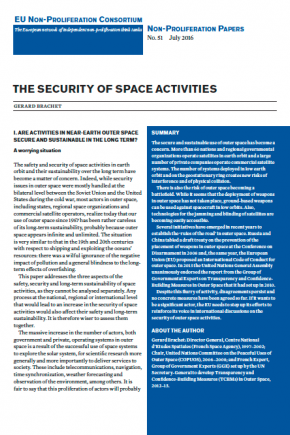The Security of Space Activities
The secure and sustainable use of outer space has become a concern. More than 60 nations and regional governmental organizations operate satellites in earth orbit and a large number of private companies operate commercial satellite systems. The number of systems deployed in low earth orbit and on the geostationary ring creates new risks of interference and of physical collision.
There is also the risk of outer space becoming a battlefield. While it seems that the deployment of weapons in outer space has not taken place, ground-based weapons can be used against spacecraft in low orbits. Also, technologies for the jamming and blinding of satellites are becoming easily accessible.
Several initiatives have emerged in recent years to establish the ‘rules of the road’ in outer space. Russia and China tabled a draft treaty on the prevention of the placement of weapons in outer space at the Conference on Disarmament in 2008 and, the same year, the European Union (EU) proposed an International Code of Conduct for outer space. In 2013 the United Nations General Assembly unanimously endorsed the report from the Group of Governmental Experts on Transparency and Confidence- Building Measures in Outer Space that it had set up in 2010.
Despite this flurry of activity, disagreements persist and no concrete measures have been agreed so far. If it wants to be a significant actor, the EU needs to step up its efforts to reinforce its voice in international discussions on the security of outer space activities.

